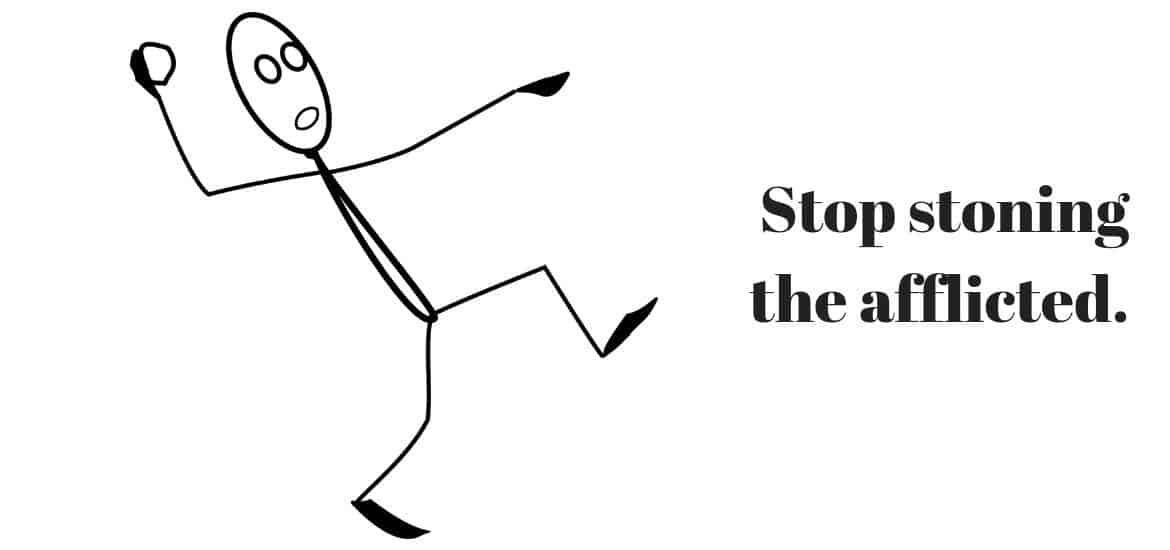I am often gobsmacked as I read some responses to Social Media statuses posted by people who are facing a life-altering crisis or who are afflicted by a chronic disability. While the majority of comments are appropriately encouraging and empathetic, there are always those comments that wound, offering clichéd advice. “Get past this as fast as you can, grab your faith by the bootstraps and pull yourself up.” “Quit speaking a negative confession.” I find that comments such as these are usually made by people who are uncomfortable with not knowing all the answers and who are insecure around the subject of suffering. They want such discussions to go away. However, to those who are experiencing mind-numbing pain, such comments are daggers to the heart.
When a person is grieving, that hurt is an open, gaping, festering wound. While a person is usually quite resilient against reckless remarks when all is right in their world, the slightest brush against their wounded heart is agonising.
If you don’t know how to respond to another person’s distress, take your cue from our Master. What was Jesus’ response to those who came to Him brokenhearted and in need of healing? Did He lecture them on their lack of faith? Did He identify the cause of their ongoing problem as doubt? Before Jesus raised someone from the dead, did He give their families a stern lecture, advising them to push past their sorrow into victory? No.
Although Jesus knew He held power to raise Lazarus from the dead, He comforted Martha and spoke hope to her heart. He acknowledged Mary’s pain and did not rebuke her for her grief. Jesus identified with the sisters’ pain and wept openly at the loss of His friend. He did not rebuke them for their accusations spoken from desperation. I recommend you meditate on John 11:1-44, taking careful note of how Jesus interacted with the sisters.
Jesus saved rebukes for a lack of faith for His inner circle and Jewish leaders. He only had words of encouragement for those who came to Him in brokenness. He wept with those who wept. Jesus showed the love of His Father, the Father of all Comfort, to those who were hurting. He perceived their need and then went about meeting that need in practical ways. Our Redeemer gave sight to the blind. He healed the lepers and restored them to their communities. Jesus forgave the sins of the sinners and delivered those who were tormented by the evil one. Our Saviour extended grace to the weary and brought hope to the hopeless.
I, Katherine Walden, am afflicted by a disease called Charcot Marie Tooth. It does not own me, and I identify myself as a Child of God much more than I define myself as a disabled person. Nevertheless, I don’t deny the fact my body needs to be healed. I declare the goodness of God; I know that God heals today. He has the power to heal me, and His desire to do so is just as great, if not more, than my wish to be healed. However, if someone asks me why I use a walker, I am not afraid to speak the name of the disease that rages my body. I don’t believe the nonsense that speaking the words disability or Charcot Marie Tooth will curse me. That is nothing but foolish superstitious rubbish. The name of Jesus has more power than any name; spoken or unspoken.
Personal Application
Before you give a word of exhortation to someone who is grieving, be willing to sit quietly with them in their pain. Before you rebuke someone for their lack of faith, offer to pray with them. Before you tell someone to buck up, listen to their story. Before you blame the afflicted for causing their affliction, remember all the foolish things you have done in your life. Remember how grateful you were for those who reached out with non-judgmental helping hands. When you are tempted to rebuke someone for their choice of words when they are distraught, keep silent. Allow them to pour out their heart and then speak. Keep in mind, God does not need you to defend His character.
Before you rebuke someone for their choice of words to describe a disability that they live with, remember we serve the Name above all names. Saying that you have a disease or a disability is merely stating a fact. It is not a statement of unbelief. A statement of unbelief would be, “I have a disability, I asked God to heal me once, I am not healed. Therefore, God doesn’t want to heal me. He can’t heal me. He gave this disease to me to teach me a lesson.”
Before you tell a person that they are not healed because hidden sin or unforgiveness in their heart, be absolutely sure God spoke that to you. Then be doubly sure God told you to confront them with this revelation. It is all too easy to blame a person for not being healed. After all, it’s not God’s fault they are not healed. It surely can’t be ‘your’ fault, you followed all the steps prescribed in that School of Healing you attended years ago. Therefore, it must be THEIR fault. That sort of logic has wounded countless people. Whether or not a person receives healing after you prayed for them, if that person If a person does not feel loved, you have failed to express God’s heart to them.
Please don’t add the burdens of guilt or shame to a disabled or grieving individual who already carries a heavy load.
Don’t forget. Follow me on my personal timeline on Facebook. You do not need to send me a friend request to follow me although I welcome friend requests please message me there to say you know me from the website or email list! Here is the Facebook link.
If you are coming here from Facebook, you might not be aware that you can receive these weekly devotions via email. Sometimes, Facebook doesn’t show my links to these devotionals and so you might not see when I post something new. How to fix that? Sign up for my weekly email that not only includes a devotional but also seven quotes from prominent authors, speakers, and heroes of our faith. I do not use this mailing list for any other purpose!
All Bible verses attributed to the ESV version unless otherwise indicated.
Until Next Week
2018 Katherine Walden
Sign up to receive a weekly emailed devotional by Katherine by using the following form.

